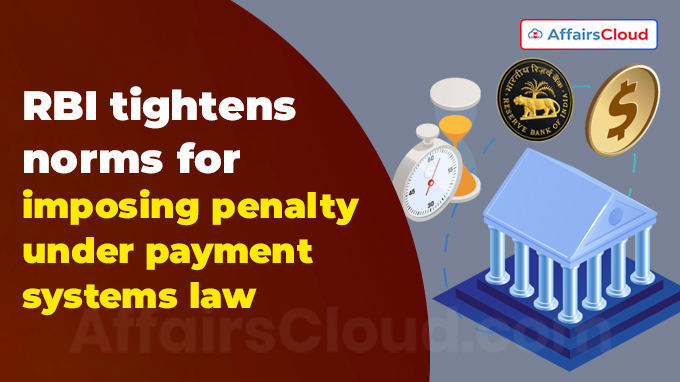 In January 2025, the Reserve Bank of India (RBI) has tightened norms for imposing monetary penalties and compounding offences under the Payment and Settlement Systems Act (PSS Act, 2007). The new norms aim to consolidate and rationalize enforcement actions by the RBI.
In January 2025, the Reserve Bank of India (RBI) has tightened norms for imposing monetary penalties and compounding offences under the Payment and Settlement Systems Act (PSS Act, 2007). The new norms aim to consolidate and rationalize enforcement actions by the RBI.
- The new framework which has been introduced for payment system operators and banks that outlined various contraventions and penalties such as: operation of a payment system without authorization, disclosure of information, which is prohibited, and failure to pay the penalty imposed by the RBI within the stipulated time period, among others.
Key Features:
i.RBI has been empowered under Section 30 of the PSS Act, to impose a penalty not exceeding Rs 10 lakh or twice the amount involved in such contravention or default where such amount is quantifiable, whichever is more.
Note: Previously, the RBI was empowered to impose a penalty up to Rs 5 lakh. The amount was increased following the enactment of the Jan Vishwas (Amendment of Provisions) Act, 2023, which came into force on January 22, 2024.
ii.In cases where such contravention or default is repeating one, a further penalty of maximum Rs 25,000 for every day after the 1st instance, during which the contravention or default continues, can also be imposed.
iii.Section 31 of the PSS Act, 2007 has empowered an officer of RBI duly authorised to compound contraventions, excluding those offences punishable with imprisonment only or with imprisonment and fine.
iv.The authority which has been designated for imposing monetary penalty and compounding contraventions, is required to form a committee comprising 3 Executive Directors (EDs) handled by the Central Office of Enforcement Department (ED).
- The committee is required to include the Regional Director and two senior officials at the Regional Office of ED.
v.The amount of penalty will be determined based on the principles of proportionality, intent and mitigating factors, if any.
- The compounding amount will be calculated on the same factors as of monetary penalties.
- The compounding amount may be 25% less than the calculated amount of penalties.
- In case of repeated contraventions (within a period of 5 years), the compounding amount may be increased by 50% of the calculated compounding amount, subject to limits prescribed under statutory provisions.
vi.The monetary penalty or compounding amount is required to be paid within 30 days from the date of receipt of penalty or compounding order, as the case may be.
- In the case where the penalty amount is not paid within the stipulated time period, RBI is empowered to initiate appropriate action against the contravener as per section 8 or section 30 (3) or section 33 of the PSS Act, 2007.
vii.The RBI mentioned that only material contraventions will be considered for enforcement action in the form of imposition of monetary penalty or compounding of offences.
Recent Related News:
In December 2024, the Reserve Bank of India (RBI) injected Rs 6,956 crore into the banking system to manage the increasing liquidity deficit, following a surplus liquidity of Rs 1.4 lakh crore that lasted more than two months.
- The liquidity deficit has arisen due to a negative balance of payments in Q3FY25, totaling USD 23 billion, driven by continued outflows from foreign portfolio investors (FPI) and the RBI’s dollar sales in the market to stabilize the rupee.




